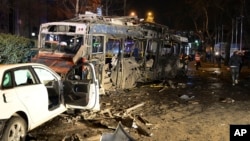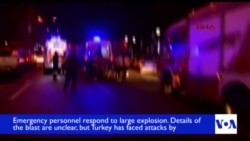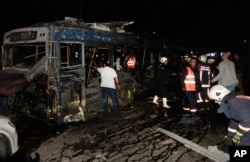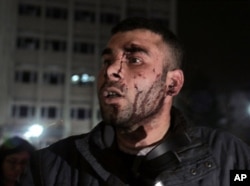Turkey pointed Monday to two Kurdish rebels -- a man and a woman -- as likely responsible for the deadly suicide car bombing in Ankara that killed 37 people and wounded another 125.
After visiting the wounded at an Ankara hospital, Turkish Prime Minister Ahmet Davutoglu said there are "almost certain findings" implicating the outlawed Kurdistan Workers Party, or PKK.
"Whenever the terrorist organization is backed into a corner and confronted with a serious security operation, it carries out such attacks directly targeting civilians in order to drag people into despair," he said.
Davutoglu said officials have detained 11 suspects they accused of being directly linked to the bombing.
President Recep Tayyip Erdogan called for a change in the definition of terrorism under Turkish law, saying anyone who abets or supports those who pull a trigger or blow up a bomb should also be considered terrorists.
Sunday's attack in Ankara's Kizilay square, a key shopping center and transportation hub in the Turkish capital, was the second deadly blast in the last month that government officials have blamed on Kurdish militants.
For three decades, Kurdish militants have fought government forces for more autonomy in southeastern Turkey, but since July, about 210 people have been killed in five suicide bombings that have been blamed on Kurdish rebels or Islamic State jihadists.
After the latest blast, Turkish President Recep Tayyip Erdogan vowed to bring "terrorism to its knees."
Foreign Minister Mevlut Cavusoglu said on Twitter, "With the power of our state and wisdom of our people, we will dig up the roots of this terror network which targets our unity and peace."
There has been no claim of responsibility for the bombing, which Health Minister Mehmet Muezzinoglu said targeted civilians at a bus stop.
Meanwhile, Turkey's military said its warplanes Monday carried out 18 airstrikes targeting Kurdish militants in northern Iraq. Ammunition depots, bunkers and shelters were among the targets.
Turkish forces have been carrying out an offensive against the PKK since July, when Erdogan declared the fight would continue until every militant is defeated.
The United States quickly condemned the Ankara attack and reaffirmed its "strong partnership with our NATO ally Turkey in combating the shared threat of terrorism."
Aside from its fight with Kurdish rebels, Turkey has been targeted by Islamic State, which was blamed for a suicide bombing at a peace rally last October in Ankara. The incident, which left more than 100 people dead, was the bloodiest single terrorist attack since Turkey became a modern state in 1923.
Media ban
As it has done several times over the last two years, Turkey has imposed a ban on media coverage of the bombing.
"A temporary ban on reporting the said incident has been considered appropriate as per receipt of a note from the Prime Ministry," Turkey's Radio and Television Supreme Council announced on its website.
Turkish journalists operate under some of the most restrictive media conditions in the world, media watchdog groups say. There has been a spike in prosecutions of journalists in Turkey, many charged with anti-terrorism offenses or with violating laws against insulting the president.
After several bombings this year, Turkey put out edicts limiting media coverage. Last March, the Turkish government ordered a media ban after a hostage situation in an Istanbul courthouse. Another ban was ordered regarding the investigation of two blasts in Ankara in October.
Monday's ban requires media outlets to rely on the statements of official authorities and avoid any independent coverage. Turkish government officials contacted by VOA were not available for comment.
Users in Turkey said access to social media was "extremely slow or blocked after the explosion." VOA's Turkish service reported a sharp spike in its social media traffic, with coverage of Sunday's bombing generating more than 600,000 "likes" posted on Facebook.
The crackdown is extending to other areas of civic society, as well. Dr. Esra Mungan, one of the organizers of a petition signed by more than 1,000 academics that calls for a resumption of peace efforts with the Kurdish rebel group, was arrested and detained Monday, along with two colleagues, on charges of terrorist propaganda.
VOA's Dorian Jones contributed to this report.















